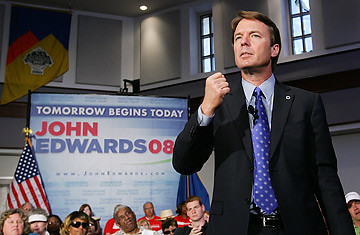
Earlier today, Al Gore and Rajendra K. Pachauri, the head of the Intergovernmental Panel on Climate Change, accepted their Nobel awards in Oslo.
Sven from My Silver State has wonderful photos from the event.
In Gore's acceptance speech, I was struck by the notion that his passion had increased and with stronger resolve to raise awareness about this ongoing issue after the SCOTUS vote on the 2000 election.
"The distinguished scientists with whom it is the greatest honor of my life to share this award have laid before us a choice between two different futures - a choice that to my ears echoes the words of an ancient prophet: "Life or death, blessings or curses. Therefore, choose life, that both thou and thy seed may live."
But instead of looking back on their work and all what they have accomplished, Gore and Pachauri gave a sobering look at the future by stating the present dangers of global warming, and urged all countries to stop the assault on the planet.
Follow me..
From the
NYT:
Mr. Gore called on the negotiators to establish a universal global cap on emissions and to ratify and enact a new treaty by the beginning of 2010, two years early. And he singled out the United States and China — the world’s largest emitters of carbon dioxide — for failing to meet their obligations in acting to mitigate climate change. “They will need to make the boldest moves, or stand accountable before history for their failure to act,” he said.
And he added:
“Both countries should stop using the other’s behavior as an excuse for stalemate and develop an agenda for mutual survival in a shared global environment.”
(To further enjoy the celebration of this award, Think Progress has captured it and provided a
link. )
Related to shared goals, Rajendra K. Pachauri presented statistical-filled presentation of the possible consequences of climate change. He said that the prize committee’s decision to award the Nobel to the panel “can be seen as a clarion call” for the world to face up to the gravity of the situation. His words include something that resonate with this blogger: the insecurity that the crises feeds into famine, poverty, lack of natural resources, all competition as fodder for additional conflicts.
From
Rachauri's address:
The IPCC Fourth Assessment Report concludes that non-climate stresses can increase vulnerability to climate change by reducing resilience and can also reduce adaptive capacity because of resource deployment towards competing needs. Vulnerable regions face multiple stresses that affect their exposure and sensitivity to various impacts as well as their capacity to adapt. These stresses arise from, for example, current climate hazards, poverty, and unequal access to resources, food insecurity, trends in economic globalization, conflict, and incidence of diseases such as HIV/AIDS.
Within other areas, even those with high incomes, some people (such as the poor, young children, and the elderly) can be particularly at risk.
Migration and movement of people is a particularly critical source of potential conflict. Migration, usually temporary and often from rural to urban areas, is a common response to calamities such as floods and famines. But as in the case of vulnerability to the impacts of climate change, where multiple stresses could be at work on account of a diversity of causes and conditions, so also in the case of migration, individuals may have multiple motivations and they could be displaced by multiple factors.
This explains why they were honored for their work. Critics, especially on the Republican side, did not and probably still do not understand how making our planet safer and better climate security can lessen famine and poverty, which are two reasons people flock to other countries or have power mongers (ie Sudan) who represent fear over hope.
Obviously, the speeches were designed to lead into further addresses and recommendations at the UN Conference in Bali, which has been underway since last week. The talks are between representatives of about 180 countries, some of which have ratified and some of which have not yet ratified the Kyoto Protocol.
We learned on Friday some good news was coming from Australia, whose government decided to ratify the Kyoto Protocol. Australian Prime Minister Kevin Rudd readily signed the instrument of ratification of the protocol on December 3 and the country will be a full member to the agreement by the end of March 2008. The same group said that the US would need to initiate no later than 2009 to reduce our greenhouse gases and other programs as we are one of the worst offenders.
But Gore had a few more words today about countries who do not act soon:
We, the human species, are confronting a planetary emergency - a threat to the survival of our civilization that is gathering ominous and destructive potential even as we gather here. But there is hopeful news as well: we have the ability to solve this crisis and avoid the worst - though not all - of its consequences, if we act boldly, decisively and quickly.
I don't know if Gore was referring to the passage of the Lieberman-Warner bill out the Environmental Works and Public Works committee, but I didn't think the bill was all that great. It was about too much compromise. One presidential candidate, John Edwards, had this reaction to that vote:
"Addressing global warming is one of the great moral tests of our generation, and it's time for bold action and leadership to address this crisis that threatens the globe. While I'm glad to see that global warming legislation is finally moving in the Senate, unfortunately the Lieberman-Warner bill doesn't go far enough to address the crisis of global warming. We cannot be limited in our approach by the armies of lobbyists from big oil companies and other special interests. This bill gives away pollution permits to industry for free - a massive corporate windfall - instead of doing what is right and selling them so that we can use these resources to invest in clean energy research, create a new economy of green jobs, and help regular families and business go green.
Additionally, Gore made it plain international cooperation was necessary, not just one or two countries. But he also took a swing at Bush’s cowboy antics when he said:
We must abandon the conceit that individual, isolated, private actions are the answer. They can and do help. But they will not take us far enough without collective action. At the same time, we must ensure that in mobilizing globally, we do not invite the establishment of ideological conformity and a new lock-step "ism."
That means adopting principles, values, laws, and treaties that release creativity and initiative at every level of society in multifold responses originating concurrently and spontaneously.
Edwards has said all along that our nation’s security starts with moral leadership and the ability to seek how problems fit together in order to create solutions that will benefit all of us, not just the United States. Back in September,
Edwards gave an address at Pace University that was directed at combating terrorism, but he took a more wholistic approach in the looking at the problem when he stated:
Finally, we must achieve energy independence. If we reduce our reliance on oil from instable parts of the world, Middle Eastern regimes will finally diversify their economies and modernize their societies. And fighting global climate change will reduce global disruptions that could lead to tends of millions of refugees and create massive new breeding grounds for desperation and radicalism.
There are those who are hard-core proponents of terror, and I have spoken here about how we must deal with them.
Several months ago, I proposed a sweeping effort to eliminate the poverty and instability that create the conditions for extremism, including increasing our funding for global primary education to $3 billion a year, expanded microfinance programs, ramping up our support for sanitation and preventive health care in developing nations, and dramatically increasing our promotion of constitutional democracies and the rule of law across the developing world.
And during my first year in office, I will establish a "Marshall Corps," patterned after the military reserves that will include at least 10,000 civilian experts. Its members will be deployed abroad to serve on reconstruction, stabilization, and humanitarian missions.
http://www.youtube.com/watch?v=3rwa1PxBpzs
John Edwards is heeding what Al Gore and believes what Gore, Pachauri, and the UN are telling us. In the words of Gore:
However, despite a growing number of honorable exceptions, too many of the world's leaders are still best described in the words Winston Churchill applied to those who ignored Adolf Hitler's threat: "They go on in strange paradox, decided only to be undecided, resolved to be irresolute, adamant for drift, solid for fluidity, all powerful to be impotent."
Edwards declared on December 7th in support of a new international framework that he would gladly meet with the leaders as President:
“Our government should be offering the world more encouragement than the inadequate remark by the U.S. representative that our country would ‘not be a roadblock.’ America should be a leader in development of a new treaty that arrests climate change to block the worst effects of global warming. That means binding emission reduction targets, protocols for technology transfers to support efforts by developing countries and an aggressive approach to stopping deforestation.
“As president, I intend to meet with world leaders in my first 100 days in office to personally offer America’s support for a vigorous and comprehensive effort to halt global warming.”
The most powerful statement that ended Gore's speech today:
It is time to make peace with the planet. And
So let us renew it, and say together: “We have a purpose. We are many. For this purpose we will rise, and we will act.”
Edwards’ response:
it is time for us to be patriotic about something other than war. 
Gore asks us to take bold steps, not just contemplation or baby steps. Edwards wants to lead us in that direction, and it will take a lot of strength, courage and backbone. Are we ready?
I am.
 UPDATE:
UPDATE: I had e-mailed the campaign to see if Edwards had a statement about today's ceremony. Wow, they answered me pretty quickly. Here is the
statement:
“Today’s award by the Nobel Committee recognizes three decades of Vice President Gore’s prescient and compelling advocacy for the future of the Earth. His passionate voice and calls for change have echoed throughout America and the world and sparked a true movement to save our plant from global warming. Now, more than ever, we must be stand united as one nation and meet the moral test of generation that compels us to leave a better America and a better world to our children and all future generations.”
Seems to fit.
To conclude, I remember a quote by a famous poet:
"Whatever you can do, or dream you can, begin it."-Goethe
Labels: benny's world, John Edwards







